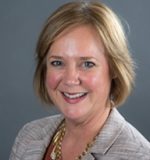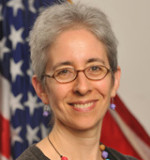Unlocking the power of big data to catalyze evidence-based policy: An interview with Amy O’Hara, Georgetown University – Episode #172
 Administrative data – in other words, big data produced by public agencies and programs – is a valuable tool for program evaluation, research and analysis that can help improve government performance and tackle our nation’s pressing challenges. How can we enable more qualified researchers and government program managers to security and more easily access those data? We get insights from Dr. Amy O’Hara (@amy__ohara), a national expert on improving secure, responsible data access for research and evaluation.
Administrative data – in other words, big data produced by public agencies and programs – is a valuable tool for program evaluation, research and analysis that can help improve government performance and tackle our nation’s pressing challenges. How can we enable more qualified researchers and government program managers to security and more easily access those data? We get insights from Dr. Amy O’Hara (@amy__ohara), a national expert on improving secure, responsible data access for research and evaluation.
Dr. O’Hara is a Research Professor in the Massive Data Institute and Executive Director of the Federal Statistical Research Data Center at the McCourt School for Public Policy at Georgetown University. She was previously a senior executive at the U.S. Census Bureau where she founded the Center for Administrative Records Research and Applications (CARRA), the Bureau’s administrative data unit.
 What insights can public leaders gain from leading companies about building a culture of experimentation? To find out, we’re joined by
What insights can public leaders gain from leading companies about building a culture of experimentation? To find out, we’re joined by  Attracting a police force from diverse backgrounds is one important step in ensuring that citizens are well served by their police departments and have trust in the police. But what steps can police departments take that are effective in achieving that goal?
Attracting a police force from diverse backgrounds is one important step in ensuring that citizens are well served by their police departments and have trust in the police. But what steps can police departments take that are effective in achieving that goal? Over the last two years, the Small Business Administration has made laudable progress in building and using evidence in order to learn what works and help programs improve. That includes launching an evaluation office and a chief data officer role within the CFO’s office, as well as creating a learning agenda to identify priority research questions from its bureaus.
Over the last two years, the Small Business Administration has made laudable progress in building and using evidence in order to learn what works and help programs improve. That includes launching an evaluation office and a chief data officer role within the CFO’s office, as well as creating a learning agenda to identify priority research questions from its bureaus. It has been estimated that more than half of Americans are saving too little to support an adequate lifestyle if they plan to retire at age 65. It was economist and recent Nobel prize winner Richard Thaler who suggested a fix: Make payroll retirement savings plans available to everyone and then by add design features to make it easier for workers to make good choices.
It has been estimated that more than half of Americans are saving too little to support an adequate lifestyle if they plan to retire at age 65. It was economist and recent Nobel prize winner Richard Thaler who suggested a fix: Make payroll retirement savings plans available to everyone and then by add design features to make it easier for workers to make good choices.
 Low-income and first-generation students enroll in and complete college at much lower rates than their more advantaged peers. This is particularly problematic because of the strong link between educational attainment and subsequent earnings, underscoring the need to find effective strategies that promote persistence and degree attainment.
Low-income and first-generation students enroll in and complete college at much lower rates than their more advantaged peers. This is particularly problematic because of the strong link between educational attainment and subsequent earnings, underscoring the need to find effective strategies that promote persistence and degree attainment. The U.S. Department of Health and Human Services recently launched a pilot version of a new initiative called the
The U.S. Department of Health and Human Services recently launched a pilot version of a new initiative called the  The Bipartisan Budget Act of 2018, passed by Congress and signed by the President on February 9th, 2018, contains several noteworthy bright spots in the use of data and evidence-based policy. Those wins suggest there is continuing bipartisan support in Washington for using evidence, data and innovation to improve the results and cost-effectiveness of Federal programs and policies.
The Bipartisan Budget Act of 2018, passed by Congress and signed by the President on February 9th, 2018, contains several noteworthy bright spots in the use of data and evidence-based policy. Those wins suggest there is continuing bipartisan support in Washington for using evidence, data and innovation to improve the results and cost-effectiveness of Federal programs and policies.
 A small but growing number of federal departments and agencies have created evaluation policies that describe the principles that those agencies seek to promote when they conduct program evaluations. Those principles can include rigor, relevance, transparency, independence, and ethics.
A small but growing number of federal departments and agencies have created evaluation policies that describe the principles that those agencies seek to promote when they conduct program evaluations. Those principles can include rigor, relevance, transparency, independence, and ethics. How can program managers within public agencies — whether local, state or federal — use random assignment (in other words, a lottery) within programs to build evidence that can strengthen results and improve customer service?
How can program managers within public agencies — whether local, state or federal — use random assignment (in other words, a lottery) within programs to build evidence that can strengthen results and improve customer service?